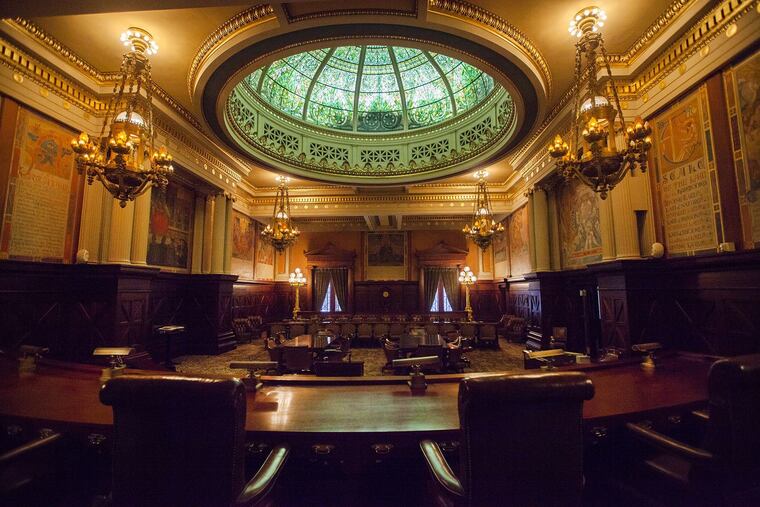Pa. bills to reinstate mandatory minimums would push our state backward | Opinion
How the latest set of bills wants to bring back mandatory minimum sentencing, how they could affect you if they become law, and why they would take Pennsylvania backward.

George Floyd, Breonna Taylor, and the many other unarmed Black people killed by law enforcement officers have not deterred Pennsylvania legislators’ commitment to pushing unsound criminal reform bills. State Rep. Todd Stephens (R., Montgomery), with nine cosponsors, has introduced House Bill (HB) 1850, HB 1851, and HB 1852. The three-bill package has been presented and tabled (i.e., set aside) four times since they were considered last September, but the sponsors persist and are expected to continue to bring them up for the House’s consideration. State Rep. Stephens previously attempted to reinstate mandatory sentencing twice in 2015, and again in 2017. Here’s what the latest set of bills proposes, how they could affect you if they become law, and why they would take Pennsylvania backward if passed.
Reinstating inefficient mandatory minimum sentencing: HB 1850 is another attempt at reintroducing legislation that the House once passed by an overwhelming majority of 165 to 31 votes, but died in the Senate Judiciary Committee. The sponsors are determined to reinstate mandatory sentences for several offenses, including offenses committed with firearms and for certain drug offenses committed with firearms. They seek to strip judges of judicial discretion by requiring a second-time offender to serve a minimum of 10 years, and a third-time offender to serve a minimum of 25 years in prison for a crime of violence. And they argue reinstating these laws will deter crime.
» READ MORE: Mandatory minimums don't reduce recidivism. So why is Pa. weighing bringing them back?
The sponsors’ argument is unsupported by the evidence that minimum mandatory sentencing does not prevent or deter crimes, does not create safer communities, and does not decrease recidivism. Mandatory minimum sentences cost taxpayers billions of dollars, ruin families and communities, and disproportionately affect poor people and people of color. And this is not just a liberal position. Conservative groups like the Charles Koch Institute also decry what the sponsors want to reinstate as “pos[ing] a real threat to both public safety and human dignity” and “represent[ing]a punishment that far exceeds proportionality to the crime.”
Making the mere possession of a gun violent crime: HB 1851 would reinstate mandatory minimum sentencing and elevate a crime committed by a felon in possession of a firearm to a crime of violence — even if the firearm was not used in the commission of the crime. If the sponsors of HB 1851 prevail at passing this bill, stories like that of Weldon Angelos — who was sentenced to 55 years confinement for selling marijuana while carrying a firearm — will not be uncommon.
Additionally, if HB 1851 becomes law, a felon’s mere possession of a gun is as much a crime of violence as a murder. Put simply, all you need to elevate your carrying crime to a violent crime is a past felony and the presence of a gun. It makes no difference whether the gun is seen by the victim or used in the offense. A prohibited person carrying, but not using, a gun will be punished as severely as a prohibited person using a gun to commit a crime. And our taxpayer dollars will pay for their equal mandatory minimum sentences.
Replacing concurrent sentencing with needlessly punitive consecutive sentencing: HB 1852 ensures “violent criminals” pay for their actions regardless of the cost to taxpayers. The sponsors argue that violent criminals who target multiple victims or commit multiple crimes should receive separate and consecutive sentences for different victims and crimes. Whereas judges now may decide to have criminals serve their terms at the same time, i.e., concurrently, HB 1852 would require consecutive sentencing.
» READ MORE: New Jersey Gov. Phil Murphy wants to eliminate mandatory minimum sentences for non-violent offenders
Imagine a Pennsylvania equivalent of Weldon Angelos is sentenced to 55 years in prison. Assuming the cost of a full year of incarceration in Pennsylvania is $42,727, confining this person would cost taxpayers $2,349,985. These calculations reflect many real cases that have incarcerated real people. Pennsylvania knows from experience that mandatory minimum sentencing does not work.
Thanks to mandatory minimum sentencing, as recently as 2010 Pennsylvania had so many prisoners that the state ran out of room to hold them, and Pennsylvania inmates had to be housed in other states. However, when the state Supreme Court invalidated mandatory minimum sentencing in 2015, the prison population decreased, and so did the Department of Corrections’ budget.
» READ MORE: Harrisburg moves backward on gun violence | Editorial
But no experience or cost has deterred the sponsors from choosing failed traditions over evidence-based reasoning. No opposition from the Governor’s Office, CeaseFire PA, the Pennsylvania Association of Criminal Defense Lawyers, Families Against Mandatory Minimums, the Philadelphia District Attorney’s Office, or the American Civil Liberties Union of Pennsylvania seems to give them cause to pause. And no pandemic or crisis of racism has stopped the attempt to bring back sentencing that largely harms Black Pennsylvanians.
We cannot expect the sponsors to show compassion on the communities their bills would harm, but we must stop them from taking Pennsylvanians a dangerous and expensive step back in time.
Keenan Rambo is a student at Penn State Law. Samantha Jallah is a Pennsylvania lawyer and writer.